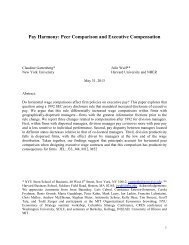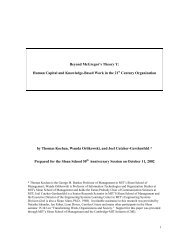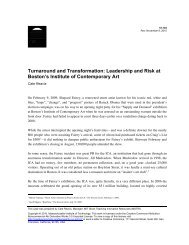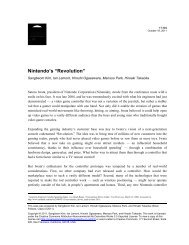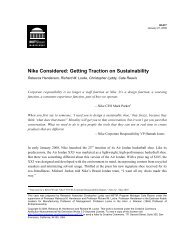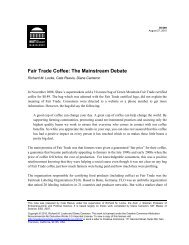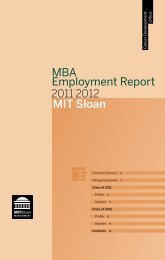Understanding earnings quality - MIT Sloan School of Management
Understanding earnings quality - MIT Sloan School of Management
Understanding earnings quality - MIT Sloan School of Management
You also want an ePaper? Increase the reach of your titles
YUMPU automatically turns print PDFs into web optimized ePapers that Google loves.
Proxies for asymmetric timeliness based on the tendency <strong>of</strong> accruals to reverse avoid the<br />
above noted problems associated with returns-based metrics. (Section 3.1.3 discusses these metrics,<br />
proposed by Basu, 1997, and implemented in studies such as Ball and Shivakumar, 2005.) Similar<br />
to the concern raised about accruals models, this attempt to control for the fundamental <strong>earnings</strong><br />
process is based on reported accrual-based <strong>earnings</strong> associated with the process (growth in sales<br />
revenue, for example).<br />
Benchmarking (Section 3.1.4): The benchmarking studies use small positive differences between<br />
reported <strong>earnings</strong> and any benchmark as a measure <strong>of</strong> <strong>earnings</strong> <strong>quality</strong>. This literature includes<br />
studies that examine the “kink” in the distribution <strong>of</strong> reported <strong>earnings</strong> around zero (e.g., Burgstahler<br />
and Dichev, 1997), as well as studies <strong>of</strong> firms that report small positive pr<strong>of</strong>its or avoid small losses,<br />
or “meet or beat” forecasts.<br />
A common but controversial interpretation <strong>of</strong> the kink in the <strong>earnings</strong> distribution around<br />
zero is that firms with small (unmanaged) losses intentionally manage <strong>earnings</strong> just enough to report<br />
a small pr<strong>of</strong>it. The evidence on whether the kink in <strong>earnings</strong> around zero implies that small pr<strong>of</strong>its<br />
likely contain a managed component is mixed at best. The relation between small pr<strong>of</strong>its and<br />
<strong>earnings</strong> management proxies is supported mostly in accrual-specific studies. Taken together, these<br />
results suggest that the use <strong>of</strong> small pr<strong>of</strong>its as a proxy for <strong>earnings</strong> management is setting-specific<br />
and not generalizable.<br />
Evidence that <strong>earnings</strong> are likely managed when firms just meet or beat an external target is<br />
more persuasive. An important caveat to this evidence is that firms that are constrained in their<br />
ability to manage <strong>earnings</strong> may not meet or beat a target (Barton and Simko, 2002). Thus, meeting<br />
14



